Josiah Parsons Cooke
Josiah Parsons Cooke (Boston, 12 de outubro de 1827 — Newport, Rhode Island, 3 de setembro de 1894) foi um químico estadunidense. ---
| Josiah Parsons Cooke |
|---|
 |
- Uma das características mais marcantes dessa nova modificação do oxigênio é seu odor peculiar, e por isso Schönbein o chama de ozônio, de um verbo grego que significa cheirar. Acontece freqüentemente que uma grande descoberta fornece os elos precários entre uma série de fatos obscuros e, portanto, acrescenta tanto ao nosso conhecimento por suas implicações indiretas quanto pelos acréscimos positivos que faz ao estoque geral. Assim foi com a descoberta do ozônio. Todo aquele que já usou uma máquina elétrica deve ter notado o cheiro peculiar que se segue à descarga elétrica. Antigamente, supunha-se que era o odor do próprio fluido elétrico; mas assim que o ozônio foi descoberto, o odor foi imediatamente reconhecido como pertencente a esse novo agente, e logo se constatou que a eletricidade é um dos meios mais eficientes de modificar o oxigênio do ar.
- - One of the most striking characteristics of this new modification of oxygen is its peculiar odor, and hence Schönbein calls it ozone, from a Greek verb signifying to smell. It frequently happens that a great discovery supplies the wanting links between a number of obscure facts, and thus adds quite as much to our knowledge by its indirect bearings as by the positive additions it makes to the general stock. So it has been with the discovery of ozone. Every one who has used an electrical machine must have noticed the peculiar smell which follows the electrical discharge. This was formerly supposed to be the odor of the electrical fluid itself; but as soon as ozone was discovered, the odor was recognized at once as belonging to this new agent, and it was soon ascertained that electricity is one of the most efficient means of modifying the oxygen of the air.
- - Cooke, J. P. (1880). Religion and Chemistry. Charles Scribner’s Sons, New York. p. 116.
- - One of the most striking characteristics of this new modification of oxygen is its peculiar odor, and hence Schönbein calls it ozone, from a Greek verb signifying to smell. It frequently happens that a great discovery supplies the wanting links between a number of obscure facts, and thus adds quite as much to our knowledge by its indirect bearings as by the positive additions it makes to the general stock. So it has been with the discovery of ozone. Every one who has used an electrical machine must have noticed the peculiar smell which follows the electrical discharge. This was formerly supposed to be the odor of the electrical fluid itself; but as soon as ozone was discovered, the odor was recognized at once as belonging to this new agent, and it was soon ascertained that electricity is one of the most efficient means of modifying the oxygen of the air.